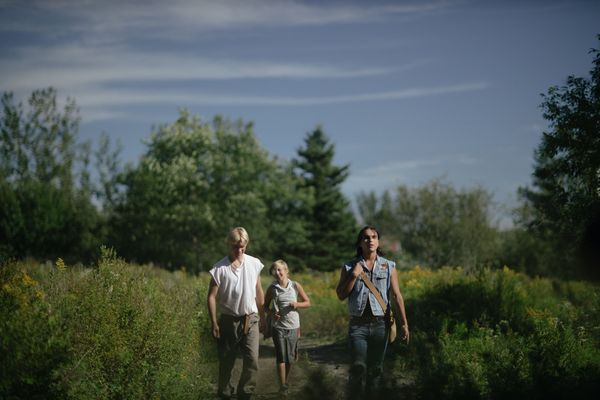 |
| Phillip Lewitski, Avery Winters-Anthony and Joshua Odjick in Wildhood Photo: Riley Smith |
It’s one of the most enjoyable outsider films of the year, a film which has done the rounds of festivals like BFI Flare and Inside Out and is now screening on Hulu. Ten years in the making, Bretten Hannam’s Wildhood tells the story of half Mi’kmaw teenager Link (Phillip Lewitski) growing up with his abusive white father and deciding to run away after he learns that his mother didn’t die after all and has sent him lots of letters which his father hid. Not really knowing where to find her, and with his young half-brother Travis (Avery Winters-Anthony) in tow, he’s lucky to get help from two-spirit travelling performer Pasmay (Joshua Odjick). As Link learns more about what it means to be Mi’kmaw and reconnects with his roots, he and Pasmay begin falling for one another, but it’s a lot to adjust to, and Hannam keeps us guessing as to how the situation will pan out.
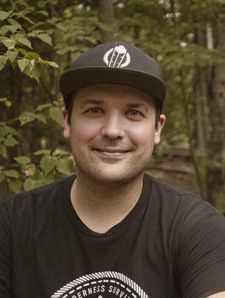 |
| Director Bretten Hannam Photo: Jack Leahy |
Along the way to realising this project in feature form, Hannam made a short film, Wildfire, which told a simplified version of the story. When I spoke with Phillip and Joshua, I asked them what it was like stepping into roles which had already been played by other actors.
“ I was a little hesitant at first,” says Phillip, “but I don't think it was because of the short. I think it was because it's such a personal story of Bretten. I felt a lot of pressure to step into their shoes because it represented a lot of what Brett is and what Brett was, and so I think that's where a lot of the pressure came from. But Brett is just the most gentle, kind, loving spirit I've ever met. And so all of that was alleviated the second I met him.
“I didn't have no reservations for the room watching the short,” says Joshua. “I felt exactly what Philip was saying about with working on Brett’s characters. It was basically so personal to Brett that I felt I had to do justice to it. You know?”
Did that help him to do more with his performance?
“Yes, definitely. It definitely was because of that, and Brett's brilliant direction.”
It helped that they enjoyed a fairly easygoing atmosphere on set, at least some of the time.
“It didn't feel rushed,” says Phillip, “but it depended on the day, I'd say. Josh, what do you think?”
“Yeah, some of the days were a little bit slow. Some days were pretty fast. And maybe, you know, sometimes, weather is a big factor. Sometimes we would have to switch around for different days.”
“But at the same time,” adds Phillip, “I feel like, I know me and Josh talked about this, but even when the days were crunched or felt rushed, Brett still allowed for this space to breathe in and for this space to express yourself and take the time that you needed to get there. And so I never actually felt rushed. But that was because of just Brett's patience, and we had our acting coach on set, really helping us and assisting us through this process. And of course, Josh was such an amazing partner to work with. It was just it was a lot of grieving, a lot of hurt, but also a lot of rejuvenation and healing.”
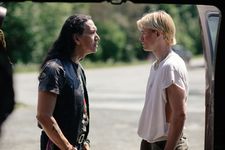 |
| Wildhood Photo: Riley Smith |
It’s really rare to see a story like this, either about indigenous people or about gender and sexual minorities, which has a happy ending, I note, and Joshua agrees.
“There was a lot of joy with the healing of the story and how the characters develop through all the hurt in the journey. A lot of the healing was very healing for myself as well, because it definitely touched on some topics that were relevant to my life”
“I just wanted to say too, John R Sylliboy, who was our two-spirit advisor, was really helpful to to shape us into what was needed to represent this community and tell this story and in the best way it can possibly be told, and so just big, big thank you to John,” adds Phillip.
Did they feel an extra weight of responsibility because of that side of it?
“Absolutely,” he says. “It's an underrepresented group. Me and Josh have had messages and people have come up to us with tears in their eyes saying ‘I've never seen myself on screen before.’ To get a reaction like that, it's all we can ask for, because we just wanted to bring honour to the story of these people.”
For Josh there was an additional challenge, because his role required him to perform traditional dances.
“ I was always interested in pow wow dancing when I was younger, but I was kind of scared. But I feel like you're never too old, or it's not too late to start dancing. And that's what I started doing. I got that motivation because of the film to take up dancing. I remember practicing off the set when we were making Wildhood, and also before travelling to Nova Scotia, I was working. Let's just say I couldn't walk for a few days.”
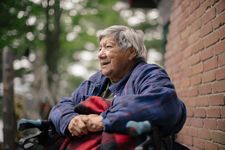 |
| Wildhood Photo: Riley Smith |
He laughs, but says that he’s kept it up, and says that he’s now interested in learning other forms of dancing, such as grass dancing, which originated on the plains.
We discuss the way that the two got into their characters, and they’re both keen to stress the teamwork involved.
“Me and Phillip would be transparent with each other,” says Joshua, and we definitely talked about what our characters were going through, and not just the characters, but ourselves and how we feel about this. Basically, if we ever had a bad day, we had each other’s backs. I feel that that was very important to the characters’ chemistry.”
They’re both shy about discussing the film’s central love scene, and though they agree with my observation that it’s narratively complicated, they say they didn’t approach it that way.
“We pretty much just did it,” says Phillip, “because by that point in the shoot we ere so comfortable with each other. And I think the biggest, the most important thing for us is just trust and transparency. Like Josh was saying, we will always check in with each other and call each other out if one of us is stepping out of line or we're acting not like ourselves. And it was like we were just going on this journey with the characters and with Bretten. And so by that point, once we got to the waterfall scene, we were so comfortable with each other we didn’t actually really block the scene or rehearse it, we just got in the freezing fucking cold water and just let Link and Pasmay play.”
One of the other challenging scenes in the film involves a woman who expresses racist sentiments which provoke very different reactions from the two characters. Joshua is keen to stress that the actress in that scene isn’t racist at all and that they talked it through beforehand. For him, the scene felt very much like personal experiences he has had, so he used that to inform Pasmay’s response.
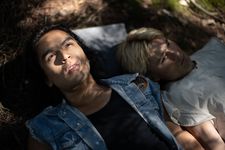 |
| Joshua Odjick and Phillip Lewitski in Wildhood |
”We would just kind of feed off each other,” says Phillip. “Pasmay is very similar to Josh and Link is very similar to me. So like just hanging out with Josh and spending time with him, I’d see how he would react to certain things different than I would. This natural thing that happened. And it's just it was really interesting to see that kind of contrast, I guess.”
And what was it like working with Avery Winters-Anthony?
“He would either make us scream and yell at him or laugh,” says Phillip.
“The little brother effect,” Joshua adds.
“He's like a little brother now because it's so perfect,” Phillip continues. “I have seven siblings. I have five brothers. He was very on point with how my little brother has always been. So it's nothing I haven’t dealt with before. It was just fun.”
We talk about the atmosphere on set, and Joshua has a story to tell.
“I remember this one instance when I don't think it was shot. I mean, it was definitely cut. But I remember, there was this one blocking scene where Guy Godfree, our cameraman, our cinematographer, was trying to get the right angles and he was kicking this dead log and all of a sudden a wasp nest popped out of nowhere and wasps started attacking Guy. I remember that that time was very exciting for me.” He laughs.
“They were attacking the whole crew and it was actually Avery's dad, who was on set, he ran right into the nest and picked it up and brought it somewhere else that we weren't shooting,” adds Phillip.
Overall, they’re both very positive about their experiences during the shoot, and Phillip says that the film’s low budget never felt like a barrier.
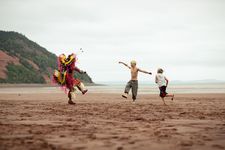 |
| Dancing on the beach Photo: Riley Smith |
“Everyone on the site cared so much about this common goal that we were all working towards I never actually felt like it was it was a small crew. Everyone just filled it that where it was needed, and supported others.”
“Everyone was personally chosen from the director and the production team. It just made everyone so tight knit and close together like we were family. It was definitely a good time to be on set,” adds Joshua.
He tells me that he particularly enjoyed shooting a scene involving cake. Anybody who has made a film with eating scenes knows that it’s best to actually eat as little as possible because there can be a lot of retakes, and he had figured that out, but nobody got the message through to the film’s younger star.
“ I chose not to eat the cake. But I that's my favourite scene because Avery, as Travis, was chowing down on those slices of cakes and he got sick in that scene. So it's like a little revenge, in a sense, an ‘I told you so.’ Because he was being a brat earlier that day so he deserved getting sick from sugar.”
Phillip enjoyed getting to ride a dirt bike for the first time and exploring the space in the club scenes. “There were a lot of really memorable moments,” he says.
They’re both excited by the reception the film has received, and have enjoyed travelling to festivals with it. As for future plans, they’re both keeping quiet for now, but Phillip drops one last hint. “You might see us in something else together.”





















